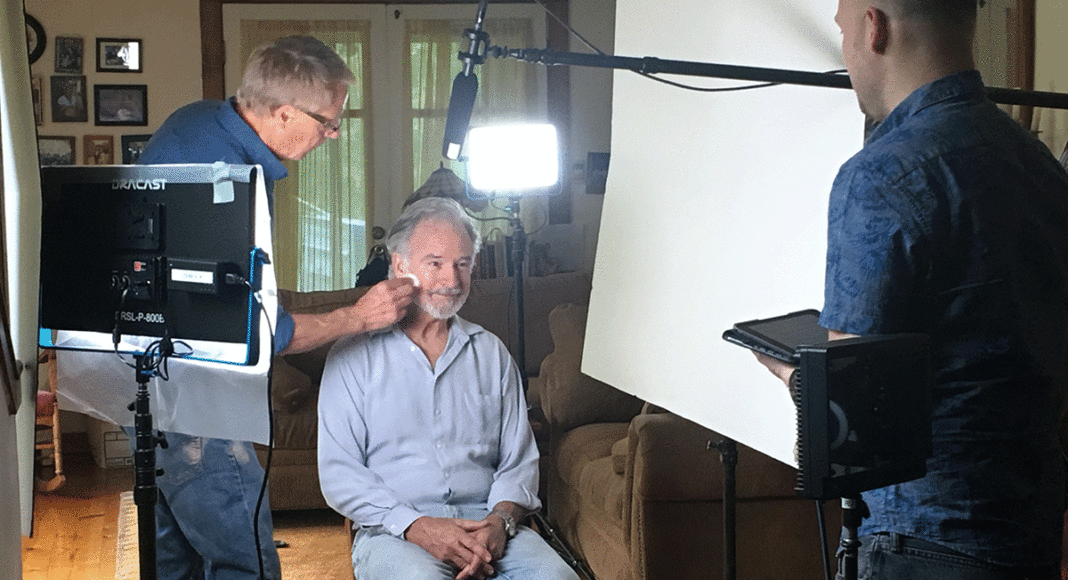With tensions in the Middle East escalating and threats of war between the U.S. and Iran grabbing headlines, now would be an appropriate moment to reflect on a gesture of peace that happened at the height of a hostage crisis that had the two countries locked in an international stand-off nearly 40 years ago.
A new BBC documentary explores a historic, yet little-known, American peace delegation that landed in Tehran in February of 1980, right in the middle of the crisis.
Fifty American peace activists risked their lives to engage in a dialogue of reconciliation with a group of Iranian students who had invited them to Iran, while the newly empowered revolutionary Islamic regime was holding 52 American diplomats and U.S. Embassy staff hostage. The documentary A Call From The Hostage Takers will air June 15 on BBC World News.
Paul Johnston, now 68, was a 28-year old labor organizer in San Francisco in 1979 when he joined the delegation. A longtime Santa Cruz resident, Johnston is now a retired sociology professor. Producers interviewed him in his Eastside home, where he recounted the hopes of the delegation, their interactions with the Iranian students and his retrospective on the impacts of Iranian hostage crisis.
In 1980, President Jimmy Carter was running for re-election against Ronald Reagan while the hostage crisis dominated media coverage. The hostages were ultimately held for 444 days and finally released the day that Ronald Reagan was inaugurated as president in January of 1981.
We now know, as depicted in the 2012 movie Argo, that the delegation landed one week after the CIA executed a bizarre-but-successful undercover operation in Tehran. Posing as a film producer scouting locations for a science fiction movie, CIA operative Toni Mendez (portrayed in the film by Ben Affleck) rescued six embassy staff from Tehran who would have otherwise been added to the list of hostages.
A group of revolutionary Iranian students extended the invitation to a faith-based, mostly anti-war organization called Clergy and Laity Concerned. The delegation included rabbis and priests, as well as African American, Native American, Chicano, and women’s rights leaders. Johnston represented the Service Employees International Union (SEIU).
Leading the delegation was Kansas University social welfare professor Norman Forer, an anti-war activist. With no official diplomatic capacity, the delegation’s primary goals were “to listen, and to learn,” Johnston says.
IN A FLASH
In Johnston’s living room, before the taping of the interview begins, the BBC producers chat about how they secured some excellent footage of the delegation. They mention that interviews with other delegation members have gone well.
“Just relax and tell us what you remember, Paul,” BBC co-producer Mark Williams coaches Johnston before the interview, “And don’t worry if you fumble or say something you may want to correct—we aren’t live.” Williams begins by asking about the delegation’s overall mission and Johnston’s relationship with Forer.
“The thing about Norm I remember the most,” Johnston says, “was his deep conviction in the power of compassion and dialogue—and holding back criticism of any adversary … He taught me about the power of apologizing.”
Apologizing for the American government’s support of the torture and mass murder at the direction of the Shah of Iran, who was finally overthrown in early 1979, was one of the Supreme Revolutionary Council’s demands for the release of the hostages.
The peace delegation and the students, Johnston explains, were “pawns in a very complicated game.” There was no small measure of “naïve hope,” he said, on both the part of the delegation and the students who had invited them to Iran.
Both sides hoped that by working together they could “temper the edge” of the right-wing reactionism in their respective countries. The students, who Johnston describes as incredibly hospitable, regarded Americans as “great and decent people,” unaware of the torture and killing by the Shah’s secret police, which had received American and Israeli training and support for decades, Johnston says.
The students hoped that after learning of the human rights abuses, Americans would protest their government’s complicity, recognize the legitimacy of the revolution and begin some kind of “truth and reconciliation” process to get past the bloody history.
The reasons this hope did not lead to more tangible results are complicated, Johnston says. As the hostage crisis dragged on and tensions escalated, right-wing factions on both sides gained ground. Military and intelligence agencies in the U.S. were pounding the drums to retaliate against an American-held hostage. Meanwhile, Islamic theocrats on the Supreme Revolutionary Council were gaining more support and influence with the increasing threat of American military intervention.
Johnston recalls that members of the peace delegation tried to hone their message to the Iranian people around three key points. The first was acknowledging that the U.S. government was indeed complicit in the Shah’s crimes, and the second affirming that the American people needed to know about the bloodshed.
Lastly, they tried to make clear that holding hostages was making these goals increasingly difficult to achieve—impeding hopes for a peaceful reconciliation, Johnston says.
PAST IS PROLOGUE
Johnston sees the Iranian hostage crisis as a “hinge of history,” a fulcrum with powerful forces teetering on either side in Washington, D.C., and in Tehran. Johnston believes the Reagan administration later used the crisis to justify covert CIA activity around the world, particularly in Nicaragua.
Johnston takes a long pause when thinking about America’s relationship with Iran now, after the Trump administration pulled out of the Iran Nuclear Deal and recent military buildup in the Persian Gulf. He fears that Trump could use war in the Middle East to help fuel his 2020 reelection bid.
“So now we’re slouching toward yet another confrontation with Iran,” Johnston says. “I am very afraid the worst could happen.”
‘A Call From the Hostage Takers’ will air at 2:10 p.m. on Saturday, June 15, on BBC World News Channel.













